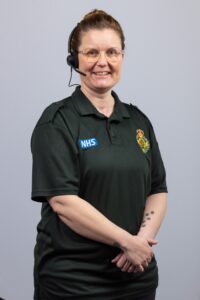NHS Boosts Emergency Care Workforce Before Winter with Hundreds More Paramedics and Call Handlers
Hundreds of new staff have joined the emergency care workforce in the North West ahead of winter – including as paramedics and call handlers – with warnings of significant pressure due to winter viruses over the next few months.
The numbers of both 999 and 111 call handlers nationally are up on last De

NWAS call handler Julie Liversidge
cember (8% and 5% respectively), meaning hundreds more staff are in place to take urgent and emergency calls.
In the North West, the North West Ambulance Service (NWAS) has recruited 250 call handlers to take 999 and 111 calls since April 2023. Figures for October for 999 calls are the highest month of the year so far (139,619), with an average call answer time of two seconds – faster than the average of 59 seconds last October.
Last year, the NHS nationally experienced incredibly high demand for NHS 111, partly driven by concerns from parents about symptoms of Strep A, with over 720,000 calls received in one week at the peak (w/e 19 Dec 2022). December was also the busiest month in December last year with 334,479 calls, a 28% increase on the previous year.
The latest North West weekly figures show that thanks to the growth in 111 call handlers and other measures outlined in the NHS urgent and emergency care recovery plan, in the week ending 3 December, the NHS 111 service answered more than twice the proportion of calls within a minute (from 25% to 61%) as the same week last year.
The number of paramedics and emergency medical technicians in the North West is also up on last December (an 8% increase equating to an additional 245 paramedics and emergency medical technicians). This means hundreds more staff are in place to respond to emergencies. In October, services saw their busiest month so far this year for Category 1 and 2 ambulance callouts.
NHS England North West Regional Medical Director for Primary Care, Dr Paula Cowan, said: “It is welcoming news that we’ve recruited hundreds of more emergency staff ahead of what many expect to be one of the most challenging winters in NHS history. In the North West we have more ambulance staff and 111 and 999 call handlers to help deal with the record demand for services as it gets busier.
“The latest figures show we are seeing sustained pressure in emergency, primary and community care, with over 95,000 beds occupied last week across the country and hundreds of patients admitted with viruses. This is why it is so important there are more colleagues at hand to help treat as many patients as possible and as quickly as possible.
“The NHS Long Term Workforce Plan was published earlier this year and which aims to retain and train many more staff. Working in the NHS, particularly on the frontline, and saving lives in our urgent and emergency care teams, is incredibly rewarding so if you are interested in joining you can find out more on our NHS careers website.
“I want to personally thank all of our clinical and allied health care professional staff across the North West. We are deeply proud of the incredible efforts of NHS staff in the region.
“They are already working incredibly hard and continue to go the extra mile to prepare and ensure our patients receive the best possible care this winter.”
Salman Desai, Chief Operating Officer for NWAS said: “As always, we are here for you when you need us most and we have robust plans in place to ensure that the high-quality service expected by our patients is maintained throughout the winter period.
“The winter months bring with it additional challenges in terms of more people needing our help, ongoing industrial action taking place across the healthcare system and an increase of seasonal illnesses, but we are as prepared as we can be for increased demands on our service, with the help of an increased frontline workforce.
“There are a number of ways that you can help us help you this winter including stocking up your medicines cupboards, ensuring repeat prescriptions are ordered in advance and making use of local pharmacies.
“Please continue to use the 999 number for emergencies only so we can ensure those in urgent need get a timely ambulance response and for other health concerns, to use 111.nhs.uk or to call 111 for children under five years.”
Julie Liversidge joined NWAS as a call handler in July and says: “My sister-in law was already a call handler with the service and really inspired me to join.
“My colleagues are brilliant, and it really feels like I’m making a difference, and it is rewarding helping the public when they need help for themselves or their family.
“I have always wanted to help people and so this role was a great next step for me.”
The increase in staff numbers come in the same year the NHS published its first ever Long Term Workforce Plan, which aims to retain up to 128,000 more staff over the next 15 years in addition to training record numbers of doctors, nurses and other healthcare professionals.
NHS staff are already experiencing significant pressure with figures for the week ending 3 December showing an extra 1,200 patients in hospital compared to the same week last year, increases in winter viruses – particularly norovirus – and challenges discharging patients to settings such as social care.
Robust NHS plans for winter, set out earlier than ever before, have seen the nationwide rollout of care ‘traffic control’ centres, extra ambulances and beds and the rapid expansion use of the world-leading and innovative virtual ward programme, keeping patients out of hospitals and treating more people at home and in the community where appropriate.
To find more information about signing up for NHS careers, entry requirements or to read first-hand experiences, more information is available on our website.
